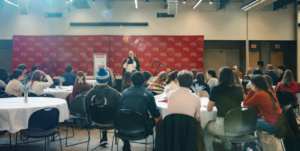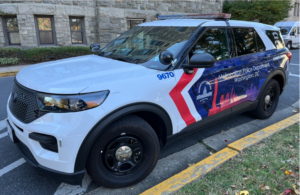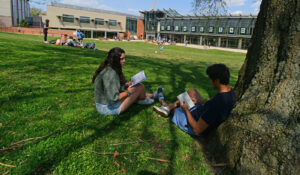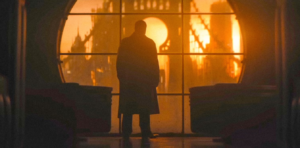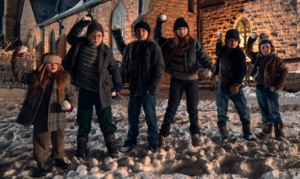The Catholic Project Presents: Shepherds to A Wounded Flock
By Eva Lynch

The Catholic Project, an initiative sponsored by the Catholic University of America committed to spiritual healing, presented a panel of four priests to lead a discussion entitled “Shepherds to A Wounded Flock: How Our Priests See the Crisis,” on Wednesday evening.
The Catholic Project fulfills President Garvey’s vision of a collaboration between clergy and laity towards renewal and unity in light of the sexual abuse crisis the Church is currently experiencing. This vision came to fruition on March 26 of last year during the third installment of the “Healing the Breach of Trust” conference series held on campus.
On The Catholic Project’s website, as well as at Wednesday’s event, the project’s mission was described as “doing what can be done” to rectify the current crisis. This mission is realized through events like Wednesday’s, and the resulting constructive conversations.
Stephen White, executive director of The Catholic Project and moderator of the event, gave an overview of The Catholic Project and the purpose of this specific event, which he identified as enlightening a collective newfound sense of hope and a balm for wounded hearts. He also recognized the niche that the discussion addressed: the particular pain associated with this crisis for priests, as they are now burdened with bearing the sins of their brothers and rebuilding the trust broken within the Church. White then introduced the panel of four priests.
Episcopal Vicar for Clergy Father Paul D. Scalia has served in his home Diocese of Arlington since his ordination in 1996. A convert to Catholicism, Father Carter Griffin served in the U.S. Navy before turning to seminary, and currently serves as Rector at Saint John Paul II Seminary in Washington, D.C. Since his ordination in 2016, Louisiana native Father Robert Boxie III has been a priest of the Archdiocese of D.C. and currently serves at St. Joseph Catholic Church in Largo, Maryland as parochial vicar. Father Matthew Fish, originally from Washington State, completed his seminary studies at the Franciscan University of Steubenville in Ohio, and currently serves as Administrator at Holy Family Church and School in Hillcrest Heights. Boxie and Fish are alumni of The Catholic University of America.
After the introduction of the panelists was the question and answer portion.
Regarding his unique experience with this crisis as a direct employee of the Diocese, Scalia commented that his faith has been renewed by priests’ improved response of anger at what was not done and fear of false accusations or lack of support.
“This was an edifying response, more than 2002,” he said, and continued to comment that the solution is simple: “We have to be better priests.”
Griffin answered a question about healing and moving forward by emphasizing the importance of resistance to falling into what he called “maintenance mode” in favor of living apostolically. He also acknowledged the tendency among Catholics to be in a constant state of apology, which was followed by an urge to take advantage of this opportune time to band together in crisis and become even stronger.
“We never know what the Holy Spirit has in store, we just have to respond,” Griffin said.
Throughout the event, Boxie emphasized prayer’s role as a path to healing. He called Catholics to walk alongside their priests in prayer as disciples of Christ. He also shared his particular experience as an African American priest at an African American parish, and emphasized that though this crisis is an important one, there are other issues, specifically racism, plaguing the Catholic faith that demand attention and prayers as well.
Fish shared a personal connection to the crisis, about learning that a pastor by whom he was inspired to join the Church was one of the “worst priest abusers” listed in the Pennsylvania Grand Jury Report.
“You get frustrated and you get angry and you want to hold leaders accountable, but that only goes so far,” Fish shared.
He continued that at a certain point, he realized he had to turn to Christ for healing. Fish also shared that he experienced this past year as a blessing, because he and his parish came together in a new way and gained new inspiration together.
Prompted by a student question, these four priests agreed that the way to heal is to lean on God, be open with frustrations, and continue to pray.
As Boxie said, “You can never pray too much.”

